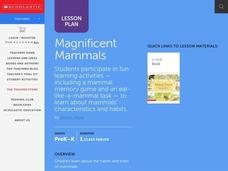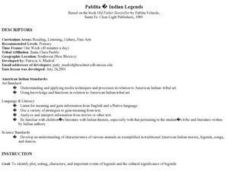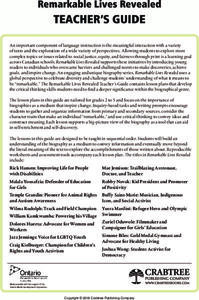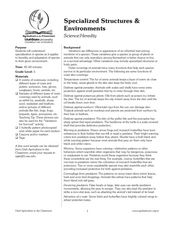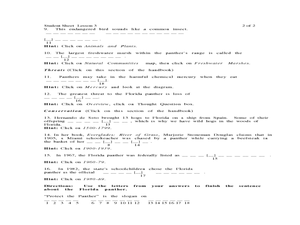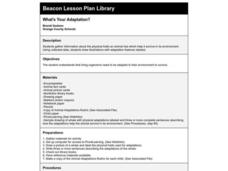Curated OER
Cold and Warm Blooded Animals
Students research facts about a cold or warm-blooded animal in order to designa report either as PowerPoint or word processed document. They use online resources and insert images in to the report. They include the specified criteria and...
Curated OER
Classification
Students complete an animal classification activity. In this classification lesson, students learn about the seven classification levels of animals. Students are given several animal sheets in which they separate 12 animals and run them...
Curated OER
What's a Mammal?
Students research his or her assigned mammal using print and online resources. In this mammals research lesson plan, students discover mammals have certain traits that distinguish them from animals in other classes, such as fish,...
Curated OER
Magnificent Mammals
Students experience center activities to study the habitats and traits of mammals. They play a memory game, eat like mammals, produce artwork and read mammal books.
Curated OER
Character Attributes in Writing
Third graders analyze the importance of characters in fiction writing and performances. In this theatre instructional activity, 3rd graders identify the important characteristics of a fictional character and how to portray a character...
Curated OER
Magnificent Mammals
Students study the habits, traits, and characteristics of mammals. They look at animal tracks that are taped around the room, and at pictures of baby and adult mammals. Next, they determine how mammals move and eat, and look at their...
California Academy of Science
Coral Reef Habitat Match
Different animals live in different habitats, and each animal has specifically adaptive traits that make them tailor-made for their environments. This is true on land and in the ocean. Little ones examine how various marine animals have...
Curated OER
Pablita Indian Legends
Scholars are introduced to the characteristics of a legend. They read and discuss Old Father Story Teller by Pablita Velarde. Then, in groups, they write and illustrate a poem based on one of the legends from the book. This lesson plan...
WK Kellogg Biological Station
Sounds of Selection
Do you want a creative and fun way to teach about natural selection? Hop to it by turning your middle school princes and princesses into frogs trying to catch as many bugs as possible in a Hungry Hungry Hippos style game. For high...
Curated OER
The Five Classes of Vertebrates
What a terrific lesson plan! Learners discuss the animal kingdom, and classify them as vertebrates and invertebrates. They also identify them as fish, amphibians, reptiles, birds, and mammals. There is even a taxonomic breakdown of...
Crabtree Publishing
Remarkable Lives Revealed
Six lessons make up a unit all about biographies. Scholars read about a remarkable life while taking notes and identifying characteristics of the biographical genre. Readers examine the tale's obstacles, accomplishments, and sequence of...
Curated OER
Specialized Structures and Environment
Fifth graders read about how different animals protect themselves, and how characteristics give animals an advantage in their environment. Students then discuss a variety of "outer" wear for humans, and what they might choose to wear in...
Curated OER
Panther Scavenger Hunt
Students research a website to learn about the Florida panther. In this animal research lesson, students use the scavenger hunt directions to search a website about Florida panthers. Students also solve word puzzles within the activity.
Curated OER
Animals Around the World
Students study different kinds of animals and what group they belong to. In this animal classification lesson students view different animals and sort them by what group they belong to, for example a snake is in the reptile group.
Curated OER
Touching Traits
Students describe objects using only their sense of touch. For this lesson on describing characteristics, students use only their sense of touch to describe an unseen object in a box. This lesson can be used an an introduction to plant...
Curated OER
Traditional African Society
Engaging your class in African culture and traditions, this presentation provides photographs, historical contexts, and societal structures from different African tribes. It poses discussion topics about the benefits and disadvantages of...
Curated OER
Animals and Their Personalities
Now that your young Spanish speakers know the Spanish words for common animals, discuss what each animal eats and their personalities. It's great that the class starts by looking at an animal, identifying a characteristic or trait it...
Curated OER
Animal Games
Students explore a variety of games on the Internet that will teach them about animals; they focus on the Florida panther. Students choose the activity that is of interest to them, and then rotate between the games online and the games...
University of Southern California
What Lives In The Ocean?
One of the most diverse environments on Earth is the ocean. Young scientists explore the living things found in the ocean during an exciting seven-lesson unit. Their study includes organisms from plankton to invertebrates and vertebrates...
Chicago Botanic Garden
Migration, Adaptation, and Changing Climates
It is easy for humans to adapt to changing environments, but how do animals and plants do it? Classes discuss how plants and animals deal with environmental changes in the second of seven lessons. Through questions and discussions,...
Curated OER
Pets: Oh Behave
They say that a dog is a man's best friend. Why is that? Discuss with your class why people like pets and the responsibilities with owning one. They read an article about pet behavior and write a short essay comparing one of their...
Curated OER
What's Your Adaptation?
Second graders gather information about the physical traits an animal has which help it survive in its environment. Using collected data, 2nd graders draw illustrations with adaptation features labeled.
Curated OER
Beautiful Birds
Students explore the traits of birds to uncover information about their eggs, feathers, beaks and other characteristics. The data is probed through a variety of exploration centers.
Curated OER
Mammal Morphology - Bats, People, and Other
In this physical characteristics learning exercise, students compare bats and humans by putting a + sign in the chart for whether or not bats and humans have the same characteristics. Students do this for 17 characteristics and answer 3...







